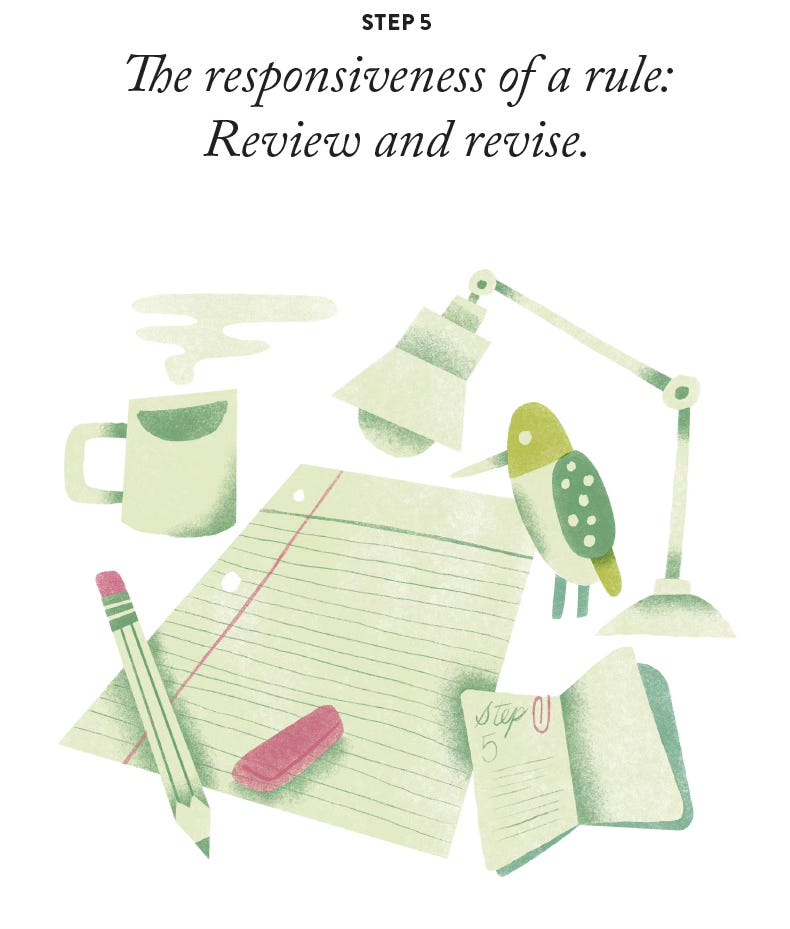Reminder: I am offering a rule of life workshop this Friday, 11 am EST to 3 pm EST. As a reader at A Habit Called Faith, you’re entitled to a 50% discount (promo code AHCF50). In the workshop, I lead participants through a five-step process for writing and keeping a rule of life. This process is outlined in the comprehensive workbook participants receive when their registration is confirmed. There’s space for you, and this back-to-school season can be a great time for reflecting on the creative, intentional faithfulness you might pursue in the year ahead. Learn more and register here.
My friend and I got back from our two-day retreat last Friday afternoon, and ordinary life was there, impatiently waiting for us. My friend’s dog had gotten sick in her absence, which required an emergency vet appointment on Saturday morning. I had house projects and groceries and errands that consumed a good part of my re-entry. These ordinary hassles were a reminder that you can never stockpile rest, even if you have the chance to take a two-day retreat. Rest is best pursued as a weekly Sabbath rhythm, which is why, even after a retreat, Sunday was its familiar godsend. It was a day consecrated to worship, to table fellowship, to good conversation—and not to opening my laptop and composing this letter. (It’s late again this week!)
Speaking of conversation, I was reminded that this is one of the foundational values of Fall Creek Abbey, where I’ve spent so much retreat time over the last nine years. Before dinner on Thursday night, the Abbey guests read aloud the day’s liturgy from Dave and Beth Booram’s Prayers at Twilight. Thursday’s liturgy is dedicated the value of conversation, and it opens by invoking the “God who Speaks, God who listens, God our Confidant and Friend,” asking, among many other petitions, for the “courage and skill to communicate deeply and vulnerably with you and with others.”
The liturgies offered in the book (which you can order here) are organized around other values Dave and Beth have sought to live out in their urban Indianapolis monastic household: quiet, vocation, beauty, presence, hospitality, wholeness. The internal structure of this book was a reminder of the holiness of lives, like theirs, which are lived in faithful response to God’s voice. One distinctive quality of such a holy, responsive life is that it is eager to hear and heed the Word of God, that it is careful to discern kingdom priorities, that it is steadfast in its commitments, that it is courageous to renounce unworthy distractions and worldly pursuits. These are not people easily moved by trials, by temptations, by the pinging notifications of modern life. They are rooted in something much deeper, and it is a gift to be in their presence.
I went to the Abbey last week with the goal of reviewing and revising my rule of life. I managed to accomplish this, though I’m seeing now that there may be a two-step process involved. First, expansion: as we begin to imagine what might be, with God’s help, in the season ahead. Then, contraction: as we get realistic about the limits to our time and capacity. I’ve done the expansion work, but this week, I’ll be engaged in more focused prayer on questions like: what am I not doing in order to make space for more hospitality this year, the ESOL class I hope to help lead, and the weekly church Bible study I might join with my mother? I’ll be asking questions like: what relationship am I intentionally investing in, and which relationships can I value with prayerful presence, even if I can’t initiate something more concerted?
A rule of life is never about fitting it all in. And that’s part of the point. It safeguards and excludes. It embraces and rejects. It practices and renounces. My sense is that we’re rarely as diligent about the second word of each of those pairs: excluding, rejecting, renouncing. It’s difficult to say what we’re not going to do for all kinds of reasons. Maybe we’re unsure of God’s clear direction. Maybe we’re fighting the recriminating voice that says we should try harder (and sleep less). Maybe we’re comparing our lives to others who manage more and manage so capably. Maybe we’re afraid that God is mostly pleased by efforts of more, never efforts of less.Maybe our own ego can’t relinquish the satisfaction that we are needed and important. And maybe we’ve just never been good at realistically assessing our capacity until, of course, we’re exhausted, bitter, and burnt-out.
The beautiful invitation of a rule of life practice is that you get to be fully and faithfully human. In conversation with God, you get to ask: what now, Lord? You get to believe that God is doing his work through many, many people—and the many, many members of his body. Even when you are not present to people and places and projects, God IS.
Perhaps, in practicing your rule of life, you begin to understand, as I did at the Abbey when I was reading Marilyn Chandler McEntyre’s A Long Letting Go, that every human life leaves behind “unfinished business.” Even our best efforts—at living well and living wisely—will neglect important work. We will leave things undone, and this is part of the grief of being human, especially in the face of our earnestness. Still, confessing this reality, we can inhabit time with less anxiety, less hurry, more joy.
As I write in In Good Time, “Living the Lord’s time is always a resistance movement.”





“you get to be fully and faithfully human” — and this practically requires that some things will be left undone. I forget this over and over. And I needed to be reminded again. Thank you. 🙏🏻
Begin again. Hit repeat as needed. This was so good. So love the Boorams.